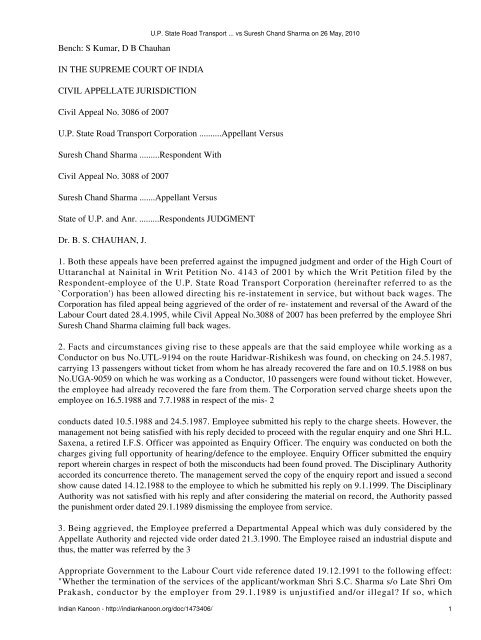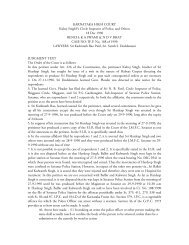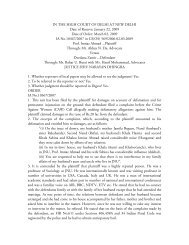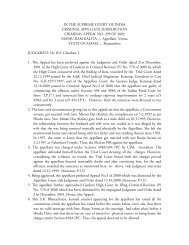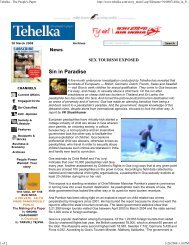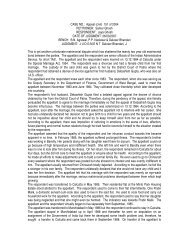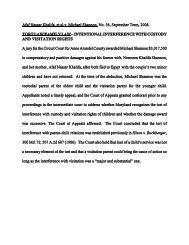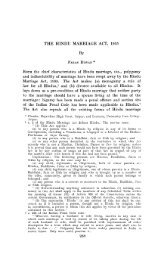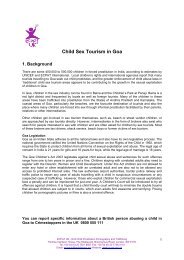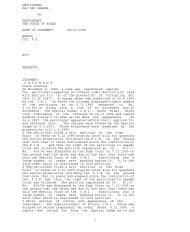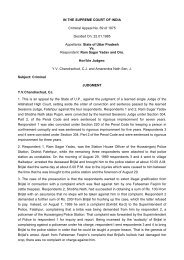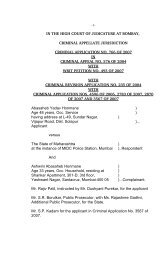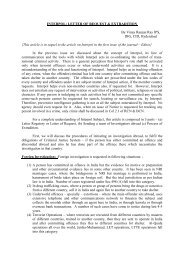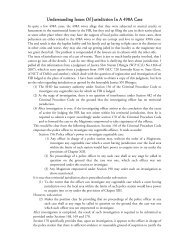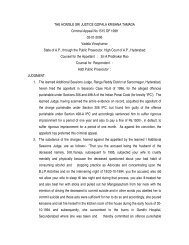U.P. State Road Transport ... vs Suresh Chand Sharma ... - IPC 498A
U.P. State Road Transport ... vs Suresh Chand Sharma ... - IPC 498A
U.P. State Road Transport ... vs Suresh Chand Sharma ... - IPC 498A
- No tags were found...
You also want an ePaper? Increase the reach of your titles
YUMPU automatically turns print PDFs into web optimized ePapers that Google loves.
Bench: S Kumar, D B ChauhanIN THE SUPREME COURT OF INDIACIVIL APPELLATE JURISDICTIONCivil Appeal No. 3086 of 2007U.P. <strong>State</strong> <strong>Road</strong> <strong>Transport</strong> Corporation ..........Appellant Versus<strong>Suresh</strong> <strong>Chand</strong> <strong>Sharma</strong> .........Respondent WithCivil Appeal No. 3088 of 2007<strong>Suresh</strong> <strong>Chand</strong> <strong>Sharma</strong> .......Appellant Versus<strong>State</strong> of U.P. and Anr. .........Respondents JUDGMENTDr. B. S. CHAUHAN, J.U.P. <strong>State</strong> <strong>Road</strong> <strong>Transport</strong> ... <strong>vs</strong> <strong>Suresh</strong> <strong>Chand</strong> <strong>Sharma</strong> on 26 May, 20101. Both these appeals have been preferred against the impugned judgment and order of the High Court ofUttaranchal at Nainital in Writ Petition No. 4143 of 2001 by which the Writ Petition filed by theRespondent-employee of the U.P. <strong>State</strong> <strong>Road</strong> <strong>Transport</strong> Corporation (hereinafter referred to as the`Corporation') has been allowed directing his re-instatement in service, but without back wages. TheCorporation has filed appeal being aggrieved of the order of re- instatement and reversal of the Award of theLabour Court dated 28.4.1995, while Civil Appeal No.3088 of 2007 has been preferred by the employee Shri<strong>Suresh</strong> <strong>Chand</strong> <strong>Sharma</strong> claiming full back wages.2. Facts and circumstances giving rise to these appeals are that the said employee while working as aConductor on bus No.UTL-9194 on the route Haridwar-Rishikesh was found, on checking on 24.5.1987,carrying 13 passengers without ticket from whom he has already recovered the fare and on 10.5.1988 on busNo.UGA-9059 on which he was working as a Conductor, 10 passengers were found without ticket. However,the employee had already recovered the fare from them. The Corporation served charge sheets upon theemployee on 16.5.1988 and 7.7.1988 in respect of the mis- 2conducts dated 10.5.1988 and 24.5.1987. Employee submitted his reply to the charge sheets. However, themanagement not being satisfied with his reply decided to proceed with the regular enquiry and one Shri H.L.Saxena, a retired I.F.S. Officer was appointed as Enquiry Officer. The enquiry was conducted on both thecharges giving full opportunity of hearing/defence to the employee. Enquiry Officer submitted the enquiryreport wherein charges in respect of both the misconducts had been found proved. The Disciplinary Authorityaccorded its concurrence thereto. The management served the copy of the enquiry report and issued a secondshow cause dated 14.12.1988 to the employee to which he submitted his reply on 9.1.1999. The DisciplinaryAuthority was not satisfied with his reply and after considering the material on record, the Authority passedthe punishment order dated 29.1.1989 dismissing the employee from service.3. Being aggrieved, the Employee preferred a Departmental Appeal which was duly considered by theAppellate Authority and rejected vide order dated 21.3.1990. The Employee raised an industrial dispute andthus, the matter was referred by the 3Appropriate Government to the Labour Court vide reference dated 19.12.1991 to the following effect:"Whether the termination of the services of the applicant/workman Shri S.C. <strong>Sharma</strong> s/o Late Shri OmPrakash, conductor by the employer from 29.1.1989 is unjustified and/or illegal? If so, whichIndian Kanoon - http://indiankanoon.org/doc/1473406/ 1
enefit/compensation the applicant/workman is entitled and to what extent?4. Both the parties appeared before the Labour Court, filed their replies and affidavits. Both parties fileddocumentary evidence and also led oral evidence and advanced submissions in support of their respectivecases. The Labour Court considered all aspects and vide Award dated 28.4.1995 held that enquiry had beenheld strictly in accordance with law and both the charges in respect of both the incidents were found dulyproved. Therefore, the employee was not entitled to any relief whatsoever.5. Being aggrieved, the employee challenged the Award by filing C.M.W.P. No.9129 of 1996 before the HighCourt of Judicature at Allahabad which was transferred to the High Court at Nainital after Re-organisation of<strong>State</strong>s and the said transferred case was registered as Writ Petition No. 4143 4(M/S) of 2001. The High Court allowed the Writ Petition partly vide impugned judgment and order dated7.9.2005 and directed the re-instatement of the employee without back wages. Hence, these appeals.6. We have heard Shri Suraj Singh, learned counsel appearing for the Corporation and Dr. J.N. Dubey, learnedsenior counsel appearing for the employee. Large number of submissions have been made by the parties and ithas been contended on behalf of the Corporation that the High Court has not recorded any reason whatsoeverwhile setting aside the Award of the Labour Court. No fault could be found with the Award of the LabourCourt and it was not necessary for the checking authority to record the evidence of the passengers who werefound travelling without tickets nor it was necessary to check the cash at the hand of the employee. The HighCourt mis-directed itself while setting aside the well- reasoned Award of the Labour Court without giving anyreason whatsoever. Thus, the appeal of the Corporation deserves to be allowed and Award of the LabourCourt deserved to be restored.5U.P. <strong>State</strong> <strong>Road</strong> <strong>Transport</strong> ... <strong>vs</strong> <strong>Suresh</strong> <strong>Chand</strong> <strong>Sharma</strong> on 26 May, 20107. Per contra, Dr. J.N. Dubey, learned counsel appearing for the employee has submitted that the High Courtwas justified in accepting the submissions on behalf of the employee that material witnesses were notexamined. Thus, no disciplinary proceeding could be initiated against the employee. There was nojustification for imposing the punishment of dismissal by the authority and once the Award of the LabourCourt is set aside, the employee was entitled to full back wages. Thus, the Corporation's appeal is liable to thedismissed and appeal filed by the employee deserves to be allowed.8. We have considered the rival submissions made by learned counsel for the parties and perused the record.9. The Labour Court has considered the matter at length and came to the conclusion that enquiry had beenconducted strictly in accordance with law. There has been no violation of the principles of natural justice orany other statutory provision. The employee was given full opportunity to defend himself, cross examined thewitnesses examined by the Corporation. The Enquiry Officer has rightly appreciated the 6evidence and found the charges proved in respect of both the incidents. The Disciplinary Authority has taken aright decision accepting the enquiry report and punishment order was passed after serving second show causeto the employee. The Labour Court recorded the findings on facts as under: "As far as the question ofconclusions drawn by the Enquiry officer is concerned, in the enquiry conducted in respect of first chargesheet dated 7.7.1988 Ext.E/2, statement of Shri Atar Singh, Traffic Inspector has been recorded wherein hehas proved the report Ext.E/1 of Shri Atar Singh, Traffic Inspector. Shri Atar Singh had checked the vehicleand 13 without ticket passengers have been found travelling from whom the petitioner-workman had alreadytaken Rs..43/- as fare. Shri Atar Singh has accordingly made a remark on the way bill and obtained thesignatures of petitioner-workman also. The petitioner-workman did not ask any question in cross-examinationto this witness. The petitioner workman has also not asked any question in cross- examination with the otherwitness Shri Kailash <strong>Chand</strong>ra, Traffic Inspector." (Ephasis added)Indian Kanoon - http://indiankanoon.org/doc/1473406/ 2
U.P. <strong>State</strong> <strong>Road</strong> <strong>Transport</strong> ... <strong>vs</strong> <strong>Suresh</strong> <strong>Chand</strong> <strong>Sharma</strong> on 26 May, 201010. The Labour Court recorded a finding of fact that in respect of both the mis-conducts the passengers werefound travelling without tickets and they had already paid fare to the employee/Conductor. Thus, it is not acase where the said employee could not issue the ticket and recover the fare from 7the travelling passengers, rather the finding has been recorded that after recovering the fare from thepassengers, he did not issue tickets to them. Thus, there was an intention to mis- appropriate the farerecovered from the passengers who were found travelling without tickets at both the times.11. The High Court dealt with the matter in a most cryptic manner. Relevant/main part of the judgment of theHigh Court reads as under:"5.....The Inspector in the cross-examination has also stated on oath that the cash was not checked. Thelearned counsel for the petitioner further submitted that when the bus was checked, ten passengers wereboarded on the bus and they were drunk and they were also denying taking the tickets. The learned Tribunalhas not considered this fact at all. I find force in the contention of the learned counsel for the petitioner. Thelearned Tribunal ought to have considered this fact that neither the passengers were examined, nor the cashwas checked. Therefore, the order of the learned Tribunal cannot be sustained in the eye of law." (Emphasisadded)12. The High Court has decided the Writ Petition only on the ground that the passengers found withouttickets, had not been examined and the cash with the employee was checked. No other reasoning has beengiven whatsoever by the Court. 813. In <strong>State</strong> of Haryana & Anr. Vs. Rattan Singh AIR 1977 SC 1512, this Court has categorically held that ina domestic enquiry, complicated principles and procedure laid down in the Code of Civil Procedure, 1908 andthe Indian Evidence Act, 1872 do not apply. The only right of a delinquent employee is that he must beinformed as to what are the charges against him and he must be given full opportunity to defend himself onthe said charges. However, the Court rejected the contention that enquiry report stood vitiated for notrecording the statement of the passengers who were found travelling without ticket. The Court held as under:"We cannot hold that merely because statements of passengers were not recorded the order that followed wasinvalid. Likewise, the re- evaluation of the evidence on the strength of co- conductor's testimony is a matternot for the court but for the administrative tribunal. In conclusion, we do not think courts below were right inover-turning the finding of the domestic tribunal."14. In view of the above, the reasoning so given by the High Court cannot be sustained in the eye of law.More so, the High Court is under an obligation to give not only the reasons but 9cogent reasons while reversing the findings of fact recorded by a domestic tribunal. In case the judgment andorder of the High Court is found not duly supported by reasons, the judgment itself stands vitiated. (Vide <strong>State</strong>of Maharashtra Vs. Vithal Rao Pritirao Chawan, AIR 1982 SC 1215; <strong>State</strong> of U.P. Vs. Battan & Ors. (2001)10 SCC 607); Raj Kishore Jha Vs. <strong>State</strong> of Bihar & Ors. AIR 2003 SC 4664; and <strong>State</strong> of Orissa Vs.Dhaniram Luhar AIR 2004 SC 1794.15. In <strong>State</strong> of West Bengal Vs. Atul Krishna Shaw & Anr. AIR 1990 SC 2205, this Court observed that"giving of reasons is an essential element of administration of justice. A right to reason is, therefore, anindispensable part of sound system of judicial review."16. In <strong>State</strong> of Uttaranchal & Anr. Vs. Sunil Kumar Singh Negi AIR 2008 SC 2026, this Court held as under:"Right to reason is an indispensable part of a sound judicial system; reasons at least sufficient to indicate anapplication of mind to the matter before Court. Another rationale is that the affected party can know why thedecision has gone against him. One of the salutary requirements of natural justice is spelling out reasons forthe order made".Indian Kanoon - http://indiankanoon.org/doc/1473406/ 3
U.P. <strong>State</strong> <strong>Road</strong> <strong>Transport</strong> ... <strong>vs</strong> <strong>Suresh</strong> <strong>Chand</strong> <strong>Sharma</strong> on 26 May, 20101017. In Raj Kishore Jha (supra), this Court observed as under:"Before we part with the case, we feel it necessary to indicate that non-reasoned conclusions by appellateCourts are not appropriate, more so, when views of the lower Court are differed from. In case of concurrence,the need to again repeat reasons may not be there. It is not so in case of reversal. Reason is the heartbeat ofevery conclusion. Without the same, it becomes lifeless".18. In fact, "reasons are the links between the material, the foundation for these erection and the actualconclusions. They would also administer how the mind of the maker was activated and actuated and theirrational nexus and synthesis with the facts considered and the conclusion reached". (vide: Krishna Swami Vs.Union of India & Ors. AIR 1993 SC 1407)19. Therefore, the law on the issue can be summarized to the effect that, while deciding the case, court isunder an obligation to record reasons, however, brief, the same may be as it is a requirement of principles ofnatural justice. Non- observance of the said principle would vitiate the judicial order.11Thus, in view of the above, the judgment and order of the High Court impugned herein is liable to be setaside.20. We do not find any force in the submissions made by Dr. J.N. Dubey, learned Senior counsel for theemployee that for embezzlement of such a petty amount, punishment of dismissal could not be justified forthe reason that it is not the amount embezzled by a delinquent employee but the mens rea to mis-appropriatethe public money.21. In Municipal Committee, Bahadurgarh Vs. Krishnan Bihari & Ors., AIR 1996 SC 1249, this Court held asunder:- "In a case of such nature - indeed, in cases involving corruption - there cannot be any otherpunishment than dismissal. Any sympathy shown in such cases is totally uncalled for and opposed to publicinterest. The amount misappropriated may be small or large; it is the act of misappropriation that is relevant."Similar view has been reiterated by this Court in Ruston & Hornsby (I) Ltd. Vs. T.B. Kadam, AIR 1975 SC2025; U.P. <strong>State</strong> <strong>Road</strong> <strong>Transport</strong> Corporation Vs. Basudeo Chaudhary & Anr., (1997) 11 SCC 370; JanathaBazar (South Kanara Central Cooperative Wholesale Stores Ltd.) & Ors. Vs. 12Secretary, Sahakari Noukarara Sangha & Ors., (2000) 7 SCC 517; Karnataka <strong>State</strong> <strong>Road</strong> <strong>Transport</strong>Corporation Vs. B.S. Hullikatti, AIR 2001 SC 930; and Regional Manager, R.S.R.T.C. Vs. Ghanshyam<strong>Sharma</strong>, (2002) 10 SCC 330. In Divisional Controller N.E.K.R.T.C. Vs. H. Amaresh, AIR 2006 SC 2730; andU.P.S.R.T.C. Vs. Vinod Kumar, (2008) 1 SCC 115, this Court held that the punishment should always beproportionate to the gravity of the misconduct. However, in a case of corruption/misappropriation, the onlypunishment is dismissal.22. Thus, in view of the above, the contention raised on behalf of the employee that punishment of dismissalfrom service was disproportionate to the proved delinquency of the employee, is not worth acceptance.Appeal preferred by the Corporation i.e. Civil Appeal No. 3086 of 2007 is allowed. The judgment and orderof the High Court dated 7.9.2005 is hereby set aside and the Award of the Labour Court dated 28.4.1995 isrestored. The appeal 13preferred by the employee i.e. Civil Appeal No.3088 of 2007 is hereby dismissed. No order as to costs.Indian Kanoon - http://indiankanoon.org/doc/1473406/ 4
U.P. <strong>State</strong> <strong>Road</strong> <strong>Transport</strong> ... <strong>vs</strong> <strong>Suresh</strong> <strong>Chand</strong> <strong>Sharma</strong> on 26 May, 2010.........................................J. (Dr. B.S. CHAUHAN).........................................J. (SWATANTER KUMAR)New Delhi,May 26, 20101415Indian Kanoon - http://indiankanoon.org/doc/1473406/ 5


